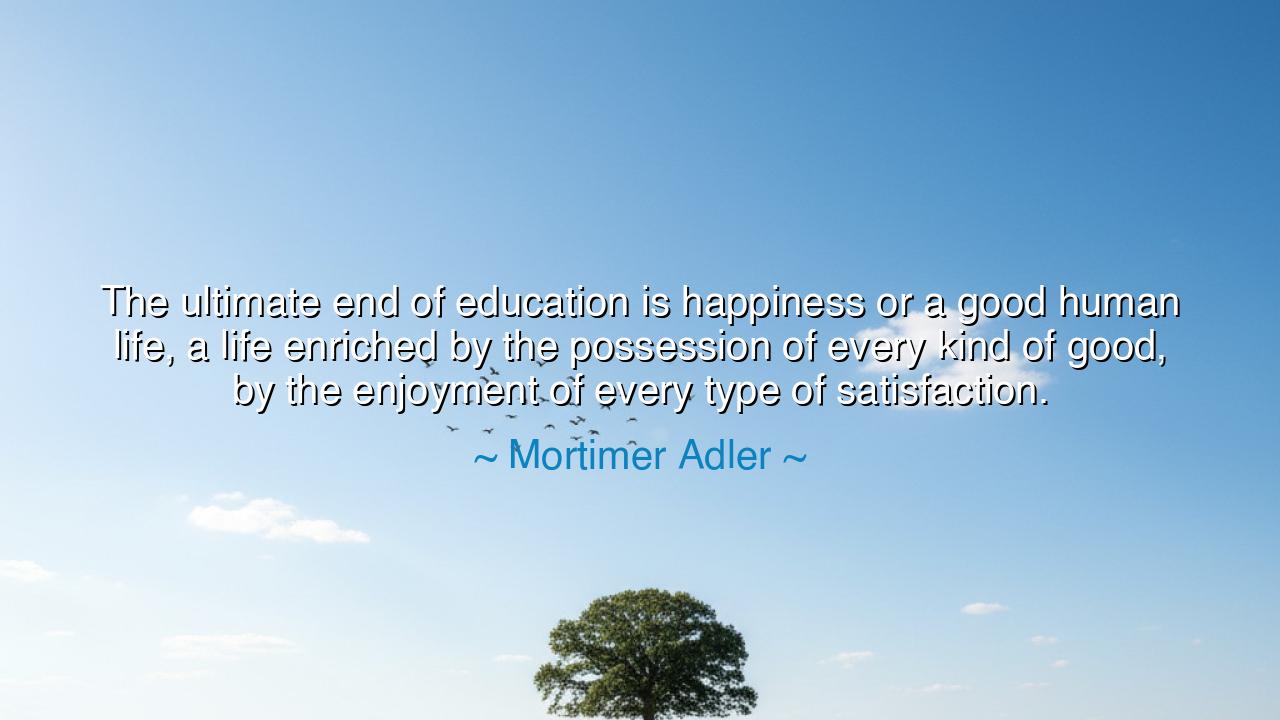
The ultimate end of education is happiness or a good human life
The ultimate end of education is happiness or a good human life, a life enriched by the possession of every kind of good, by the enjoyment of every type of satisfaction.






In the golden lineage of philosophers and teachers, Mortimer Adler, one of the greatest educators of the modern age, spoke with the wisdom of the ancients when he said: “The ultimate end of education is happiness or a good human life, a life enriched by the possession of every kind of good, by the enjoyment of every type of satisfaction.” These words reach beyond the walls of any classroom and touch the very soul of human aspiration. For Adler, education was not merely a means to employment or social standing — it was the sacred path toward the cultivation of the whole person, the flowering of mind and spirit that leads to happiness, not as pleasure, but as the harmony of a life well-lived.
To grasp the full meaning of this truth, we must understand what Adler meant by happiness. He did not speak of fleeting joy or the shallow excitement of achievement. Rather, he spoke in the same voice as Aristotle, his ancient mentor in thought, who taught that the highest purpose of human existence — the telos, or final end — is eudaimonia: the state of flourishing that arises when reason, virtue, and purpose are united. In Adler’s eyes, education was the divine art that guides a person toward that unity. Through learning, the human being discovers not only the workings of the world but the depths of their own nature. Through understanding, one becomes not just informed, but fulfilled.
In these words, Adler restores to education its ancient dignity. Once, the Greeks gathered in open courtyards and under olive trees to question, to reason, and to wonder about the nature of truth and justice. For them, the educated person was not one who knew many things, but one who had learned how to live wisely and well. Mortimer Adler, living in the restless twentieth century, saw that the world had forgotten this purpose. Education had become mechanical, utilitarian — a race to mastery without meaning. He sought to remind humanity that the ultimate goal of knowledge is not power, but wisdom; not achievement, but happiness — the happiness that arises from understanding life, embracing virtue, and delighting in the beauty of thought.
The truth of this teaching shines through the lives of those who found meaning through the pursuit of understanding. Consider Nelson Mandela, who, imprisoned for twenty-seven years, did not cease to learn. Deprived of freedom, he educated his mind and spirit, reading philosophy, studying law, and reflecting deeply on human nature. When he emerged from captivity, he was not embittered but enlightened — a man whose wisdom became a light for his nation. Through the discipline of learning, Mandela achieved not only justice for his people but also a rare happiness, born of strength, purpose, and peace. His life testifies to Adler’s belief: that education, rightly used, leads not merely to knowledge but to the wholeness of the soul.
To speak of “a life enriched by the possession of every kind of good” is to speak of balance — of the harmony between the physical, intellectual, moral, and spiritual dimensions of existence. True education teaches us to seek not one kind of good at the expense of another. It teaches the mind to think clearly, the heart to feel rightly, and the will to act justly. A person educated in this way finds satisfaction in work, in friendship, in art, in contemplation. They do not chase after happiness as a prize; they embody it through the fullness of their being. Such a life, Adler tells us, is not granted by circumstance, but cultivated — the fruit of education that enlightens both the intellect and the character.
But let none mistake Adler’s vision for an easy path. To pursue the good life requires effort, patience, and discipline. It calls for a daily turning of the mind toward truth and the heart toward virtue. The student of life must learn not only from books but from suffering, from beauty, from the silent wisdom of failure. Every experience, if understood, becomes a lesson, and every lesson, if absorbed, becomes a part of one’s happiness. Thus, education never ends; it is the lifelong art of making meaning from every breath, every struggle, every joy.
Let this, then, be the teaching passed down to those who seek wisdom: Do not learn for gain, but for goodness. Do not study merely to advance, but to awaken. Seek knowledge not to dominate the world, but to dwell in it with reverence. For in the end, all knowledge that does not lead to happiness — to the elevation of the spirit, the deepening of love, and the enrichment of life — is barren. True education, as Mortimer Adler teaches, is the alchemy that transforms the mind into understanding and the soul into peace.
So remember, O seekers of truth: the ultimate end of education is not a degree or an honor, but a good human life — one that is whole, wise, and radiant with joy. The classroom is but the beginning; the world itself is your teacher. Learn deeply, live thoughtfully, and wrest from every experience its meaning, until your days, like the greatest works of philosophy, become a harmony of wisdom and happiness.






AAdministratorAdministrator
Welcome, honored guests. Please leave a comment, we will respond soon